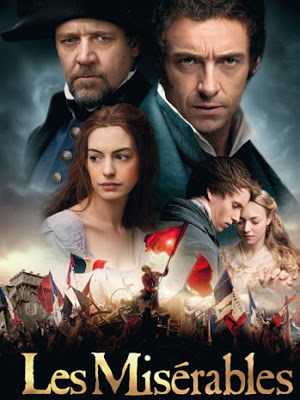If you haven’t seen the movie Les Misérables yet, you probably don’t want to continue reading this. Because it has spoilers. But mostly because you should stop WHATEVER you are doing and GO SEE IT RIGHT NOW. Seriously. Quit your job. Don’t pick up the kids from gynmastics. GO SEE THIS MOVIE.
 |
Why? Because this movie is True and Beautiful and Catholic. (More so even than its source material — both the book and the musical.)
I’m so late to the theater on this one, that I’m sure all that needs to be has already been written about its extraordinarily well-portrayed themes of forgiveness and redemption and love and self-sacrifice. And the fact that the famous people singing range from very, very good, to almost terrible. (All the not-famous people are jaw-droppingly awesome at singing, by contrast.)
But I’m supposed to be telling you if your kids can see it. And, the answer is going to be mostly, “no.” But YOU should go see it right now and tell your kids all about Les Misérables. I absolutely delighted in talking with my older kids (aged 8 and 10) about the characters in this movie. No one can be unmoved by the scene in which the Bishop tells Jean Valjean that he has bought his soul for God. Even if that person is only hearing about it second hand.
This movie is FULL of troubling subject matter. Torture, ostracism, unwed motherhood, cheating, stealing, war, suffering, prostitution, disease, death, death, death, and dentistry. But it is (almost) all treated in such a truthful and appropriate manner that I beamed inside watching it.
I did not love the scene in which a costumed St. Nicholas is lured into a brothel, seduced, and shown to be joyfully having non-graphic, but right-there-in-front-of-you relations with a prostitute. It is meant as comic relief, during a musical number, and, of course, it’s not the REAL St. Nicholas, it’s just a man in a costume. AND, just like the rest of the characters in the story, he has to deal with the consequences of his decision. Still, I wasn’t crazy about it alongside the moral tone of the rest of the movie.
Les Misérables is rated PG-13, but I would guess kids would need to be older than that to be ready to handle it. Perhaps sixteen? It’s hard to know, since I don’t have any teenagers yet. To be ready for this movie my kids will need to understand the history of the French Revolution and its aftermath, be familiar with the concept of prostitution, and be emotionally ready to see the deaths of many characters with whom the audience identifies deeply (somehow all the tight shots made me feel I was living their lives).
I cried watching this movie. A lot. A LOT a lot. So did everyone around me. But it was worth every tear.
Even the bad guy inspires our sympathy. Javert is a heartbreaking character. He is a Catholic too, just like the Bishop, and Valjean. But his is the faith of the pharisee, while Valjean has the faith of the repentant publican. Javert is broken by a compassion and forgiveness he can neither understand nor accept. His journey is truly a cautionary tale worth seeing and sharing.
Apparently Victor Hugo had an estranged relationship with the faith of his youth. And Hugh Jackman is under the impression that the line, “To love another person is to see the face of God” is an attack on the Catholic Church. All I can say is that, in this case, the whole is greater than the sum of its parts. Much greater.
While I went to see Les Misérables with my mother-in-law, the husband and his dad went to see Zero Dark Thirty. The husband offers you the following Catholic Dad Movie Review:
Do not take your kids to see Zero Dark Thirty. Thank you.
Update: Julie of Happy Catholic* reminded me in the comments that there are consequences for “St. Nicolas” for his choices. I think she makes a good point and have made some edits to this post accordingly.



